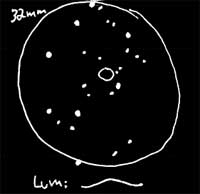
Observation Notes:
I had a heck of a time finding this, by drawing a bead off Epsilon Aquarii. It was a dim small globular. I wasn’t able to resolve it at 37X or 120X. Luminosity rises softly across its face.
Factoids:
At 53,000 light years distant, M72 is one of the more remote globular clusters cataloged by Messier. It is also one of the least concentrated, at class IX. M72 is approaching us rather rapidly at 255 km/sec. It is about 106 light years in diameter and is one of the more intrinsically luminous gloubular clusters recorded. The cluster is hard to resolve in amateur scopes, with an 8 inch scope showing hints of stars at the extreme edges. M72 was discovered by Pierre Méchain in 1780 and subsequently cataloged by Charles Messier.
| Subject | M72 (NGC 6981) | |
| Classification | Globular Cluster (Class IX) | |
| Position* | Aquarius [RA: 20:53:30 / Dec: -12:32:00] | |
| Size* | 6.6′ | |
| Brightness* | 9.3 | |
| Date/Time | October 8, 2004 – 11:15 PM (October 9, 2004 – 06:15 UT) |
|
| Observing Loc. | Flagstaff, AZ – Home | |
| Instrument | Orion SVP 6LT Reflector (150 mm dia./1200 mm F/L) | |
| Eyepieces/Mag. | 32 mm (48X), 10 mm (120X) | |
| Conditions | Unrecorded | |
| Seeing | 3-4/10 | |
| Transparency | Mag 5.5 NELM | |
| Sources | SEDS |
*Based on published data.